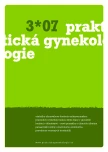-
Medical journals
- Career
Prevalence of inherited thrombophilia in patients with severe ovarian hyperstimulation syndrome
Authors: Š. Machač; M. Procházka; M. Lubušký
Authors‘ workplace: Reprofit International, Brno 1; Porodnicko-gynekologická klinika LF UP a FN Olomouc 2
Published in: Prakt Gyn 2007; 11(3): 125-128
Overview
Objective:
to determine the prevalence of markers of inherited thrombophilia in patients with severe form of ovarian hypesrtimulation syndrome (OHSS). Design: Cohort study.Material and methods:
Blood samples were analysed for markers of thrombophilias (mutation of factor V – Leiden, mutation of methylentetrahydropholat reductase (MTHFR) C677T, mutation of prothrombin G20210A and antithrombin, protein C, protein S deficiencies). Study group consist of women who underwent controlled ovarian hyperstimulation for IVF complicated by severe OHSS (group A, n = 50). Results were compared with two controls groups - women who underwent ovarian hyperstimulation for IVF without developing OHSS (group B, n = 93) and healthy pregnant women with no history of infertility (group C, n = 196).Results:
we found 7 out of 50 patients from group A positive for Leiden mutation (heterozygots) in comparison with 11 out of 93 from group B (heterozygots), p = 0,71 OR 1,21 (0,39 - 3,70) and 10 out of 196 from group C (heterozygots), p = 0,03 OR 3,03 (0,97 - 9,28). The polymorphism of MTHFR 677T gene was detected in 17 out of 50 patients (heterozygots) from group A, in 36 out of 93 patients from group B (35 heterzygots, 1 homozygot) and in 93out of 196 patients from group C (86 heterozygots, 7 homozygots) with no statistical significance. One patient from group A and one patient from group B had protein S deficiency, we did not find any protein C or antithrombin deficiencies.Conclusion:
we found increased prevalence of factor V Leiden mutation in Czech infertile women. Carriers of Leiden mutation had no ehanced risk of development severe form of OHSS during stimulation.Key words:
ovarian hyperstimulation syndrome, thrombophilia, factor V Leiden mutation
Sources
1. Brinsden PR, Wada I, Tan SL et al. Diagnosis, prevention and management of ovarian hyperstimulation syndrome. Brit J Obstet Gynecol 1995; 102 : 767-772.
2. Navot D, Bergh P, Leufer N. Ovarian hyperstimulation syndrome in novel reproductive technologies: prevention and treatment. Fertil Steril 1992; 58 : 249-261.
3. Dulitzki M, Cohen SB, Inbal A et al. Increased prevalence of thrombophilia among women with severe ovarian hyperstimulation syndrome. Fertil Steril 2002; 77 : 463-467.
4. Fabregues F, Tassies D, Reverte JC et al. Prevalence of thrombophilia in women with severe ovarian hyperstimulation syndrome and cost-effectiveness of screening. Fertil Steril 2004; 81 : 989-995.
5. Paseka J, Unzeitig V, Cibula D et al. Mutace faktoru V Leiden u uživatelek hormonální antikoncepce. Čes Gynek 2000; 65 : 156-159.
6. Biron CH, Galtier-Dereure F, Robesandratena H et al. Hemostasis parameters during ovarian stimulation for in vitro fertilisation: results of a prospective study. Fertil Steril 1997; 67 : 104-109.
7. Kodama H, Fukada J, Karube H et al. Characteristics of blood hemostatic markers in a patient with ovarian hyperstimulation syndrome who actually developed thromboembolism. Fertil Steril 1995; 64 : 1207-1209.
8. Delvigne A, Kostyla K, De Leener A et al. Metabolic characteristics of women who developed ovarian hyperstimulation syndrome. Hum Repr 2002; 17 : 1994-1996.
9. Tsanadis G, Vartholomatos G, Korkontzelos I et al. Polycystic ovarian syndrome and thrombophilia. Hum Repr 2002; 17 : 314-319.
10. Alfirevic Z, Mousa HA, Martlew V et al. Postnatal screening for thrombophilia in women with severe pregnancy complications. Obstet Gynecol 2001; 97 : 753-759.
11. Alfirevic Z, Roberts D, Martlew V et al. How strong is the association between maternal thrombophilia and reverse pregnancy outcome? A systematic review. Eur J Obst Gynecol Reprod Biol 2002; 101 : 6-14.
12. Lindquist P, Dählback B, Marsal K. Thrombotic risk during pregnancy: A population study. Obstet Gynecol 1999; 94 : 595-599.
13. Azem F, Many A, Ben Ami I et al. Increased rates of thrombophilia in women with repeatde IVF failures. Hum Reprod 2004; 19 : 368-370.
14. Mára M, Koryntová D, Řežábek K et al. Thromboembolic complications in patients undergoing in vitro fertilization: Retrospective clinical study. Čes Gynek 2004; 69 : 312-316.
15. Martinelli I, Taioli E, Ragni G et al. Embryo implantation after assisted reproduction procedures and maternal thrombophilia. Haematologica 2003; 88 : 789-793.
16. Vaquero E, Lazzarin N, Caserta D et al. Diagnostic evalution of women experiencing repeated in vitro fertilisation failure. Eur J Gynecol Reprod Biol 2005; 10 : 1253-1255.
Labels
Paediatric gynaecology Gynaecology and obstetrics Reproduction medicine
Article was published inPractical Gynecology

2007 Issue 3-
All articles in this issue
- Analysis of impact of ultrasound guidance on embryotransfer
- Importance of active screening for thyroid disorders in pregnant women
- Prevalence of inherited thrombophilia in patients with severe ovarian hyperstimulation syndrome
- Intimate hygiene in ambulatory practice
- Why not to smoke in pregnancy – new knowledge about the effects of nicotine
- Problems of paraaortic lymphonodes in endometrial cancer
- CA 125 and the value of its testing for gynecology
- Practical Gynecology
- Journal archive
- Current issue
- Online only
- About the journal
Most read in this issue- CA 125 and the value of its testing for gynecology
- Why not to smoke in pregnancy – new knowledge about the effects of nicotine
- Problems of paraaortic lymphonodes in endometrial cancer
- Analysis of impact of ultrasound guidance on embryotransfer
Login#ADS_BOTTOM_SCRIPTS#Forgotten passwordEnter the email address that you registered with. We will send you instructions on how to set a new password.
- Career

